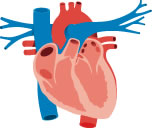Cardiovascular Disease
>

The centre of the cardiovascular system is the arterial tree, which carries blood to all the organs in the body. When this arterial tree becomes diseased and narrowed by the process known as arteriosclerosis, the blood supply to the body organs is compromised.
The most sensitive organs are the brain, the heart, the kidneys and the muscles of the legs. So when the blood supply to these areas is reduced or closed off, we speak respectively of cerebrovascular disease (transient ischemic attacks and stroke), cardiovascular disease (angina and heart attack also known as coronary heart disease (CHD)), renovascular disease and peripheral vascular disease (PAD) .
On a global scale, the health research community is now well aware of the impending global pandemic of cardiovascular diseases (CVD) and the alarmingly increasing rates of these disorders especially in less-developed countries. Current estimates show that approximately 15 million deaths each year are due to cardiovascular disease. The projections for the next 20 years are even more staggering.
The Major Risk Factors that cause Cardiovascular Diseases are:
- Family history – you cannot change this but it if there is a genetic tendency to any cardiovascular disease risk factor control becomes even more important
- High blood pressure – poor blood pressure control is the major risk for most cardiovascular disease – if you have high blood pressure make sure it is controlled over the 24-hour period – blood pressure lowering drugs are often required
- High cholesterol – you should keep your total and low density cholesterol within normal limits – statin drugs may be needed
- High blood sugar – diabetes – this may require diet, drugs and sometimes insulin
- Smoking – you should stop all smoking
- Overweight – you keep your body weight as close to normal as possible
- Sedentary existence – you should take at least a half hour of exercise every day – avoid lifts – use the stairs
You should know your numbers:
- Your ideal body mass index – this is the ratio of your height to weight.
- Blood pressure should be less than 140/90 mmHg but this depends on how your blood pressure is measured and 24-hour ambulatory blood pressure gives the most accurate readings and also provides information on the very important nighttime blood pressure – give normal figures for day and nighttime blood pressure
- Total cholesterol should be less than 5 mmol/l
- Low density cholesterol should be less than 2 mmol/l
- Blood sugar should be less than 6 mmol/l
If you are taking blood pressure tablets and your numbers are not normal ask why.